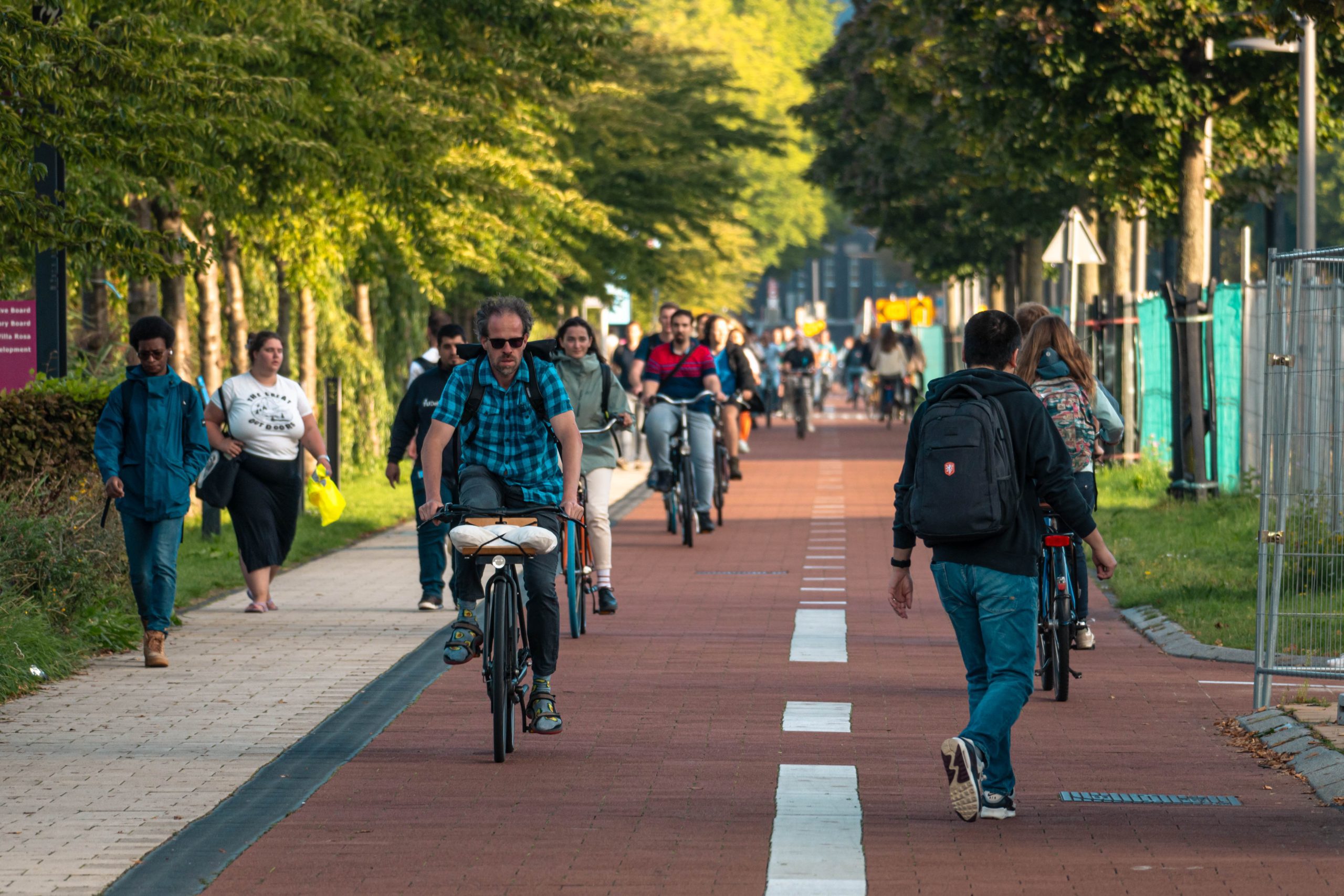The Students and Staff for Safety pressure group does not believe that the current Executive Board can pick up the pieces and make good. The pressure group was specially set up in connection with the social safety issue, and it wrote this in a statement on Thursday.
Students and staff cycling across campus. These people have nothing to do with the action group. (Photo: Thijs van Reeuwijk)
‘Our trust is completely broken’ states the pressure group in an email to Delta. “It is unclear how the executive board is planning to regain our trust. Frankly, we fail to foresee any path for them to win it back after all that has happened.” In a phone call, a spokesperson confirms that the pressure group wants the Executive Board to step down.
In the statement the protesters also say that the Executive Board only takes action if it is up against significant resistance from students, staff members, Delta and other media. They also make reference to the outcomes of the poll that they shared on 9 April.
In the poll consultation, 77.4% of the 348 respondents said that they do not believe that the current Executive Board is able to bring about a change in culture, 14% do believe the Executive Board can do so, and the remaining 8.6% do not know.
Part of the problem
According to the group, more important than these statistics (which were anonymously shared with Delta) are texts in the explanation box below the poll which about half the respondents filled in. Many respondents view the Executive Board as part of the problem. Some people believe that their historic involvement makes it impossible for them to be part of the solution. The Executive Board is ‘a wolf in a sheepskin’. “If the CvB (Executive Board, Eds.) wants what’s best for the university they should simply step down.”
Weeks ago on 5 March, Students and Staff for Safety started a petition that was filled in more than 1,100 times. One of its outcomes was that the Executive Board changed its mind about going to court. The group is also the driving force behind the sharing of the #NotMyExecutiveBoard hashtag, introduced by Delta columnist Bob van Vliet.
Afraid of the consequences
The group consists of TU Delft employees who hold different positions, from doctoral candidate to professor, a spokesperson had previously told Delta. The members remain anonymous. ‘People are afraid of possible consequences if their names are made known. We are too.’
The protesters call on everyone to, as they themselves do, state that they have lost confidence in the Executive Board and thus, automatically, in the Supervisory Board too. ”Such a statement taken on your part cannot be ignored.”
Dijkgraaf
According to the outgoing Minister of Education Dijkgraaf, it is important ‘that the current management relationships remain in place’. He believes that the Executive Board must take action to improve social safety and that the Supervisory Board must oversee this. He said this on Monday 15 April during a debate with the Parliamentary Committee on Education, Culture and Science.
Dijkgraaf is carrying out discussions with the Executive Board and the Supervisory Board to ‘ascertain that this process is in good hands’. In these discussions, the outgoing Minister regularly emphasises ‘the importance of behaviour and culture change and the role that both the Executive Board and the Supervisory Board have in this. After all, they are part of the process too. The Executive Board must itself show a change in leadership style, in culture and management, and that calls for the necessary self-reflection.’
Findings
The Inspectorate of Education investigated transgressive behaviour at TU Delft from December 2022 to November 2023. In the resulting report, the investigators speak of intimidation, racism, sexism, bullying, exclusion, gossiping, social insecurity due to lack of leadership and a culture of fear, among other things. For instance, employees are said to be afraid to voice their opinions and hold each other accountable for behaviour.
The effects among TU Delft employees who have reported to the inspection are often long-lasting and hampering. The inspectorate speaks of psychological and physical health complaints, absence from work and a general feeling of insecurity. Stress, burnout, depression and PTSD, crying and tense home situations also occur, as do illness, vomiting at work, panic attacks and heart palpitations.
The inspectorate reports that TU Delft’s university administration has a lot of information regarding what is happening in terms of social safety, but that they ‘omit to add everything up so as to create a complete picture’. ‘The management’ also ‘does not adequately manage in terms of appropriate measures’. The Inspectorate believes that this is mismanagement.
Read the news and background articles on the Inspectorate’s report in our dossier.
- Delta is looking for current and former TU Delft staff members who are willing to share their experiences. This can be done anonymously if preferred. Email tudelta@protonmail.com.



Comments are closed.